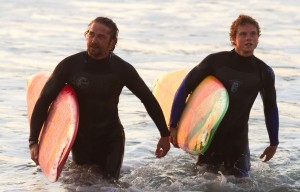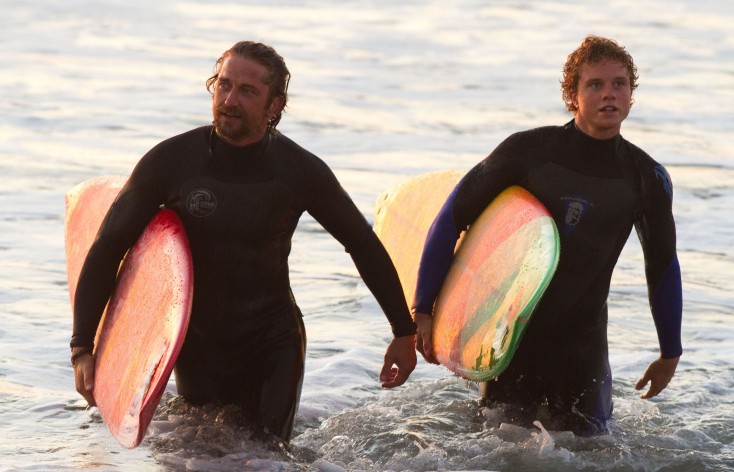
(l-r) Gerard Butler and Jonny Weston star in “CHASING MAVERICKS.” ©20th Century Fox. CR: John P. Johnson.
By ANGELA DAWSON
Front Row Features
HOLLYWOOD—Gerard Butler looks tanned as he arrives for an interview to talk about his new surfing movie “Chasing Mavericks.” But the Scottish heartthrob insists the source of his tropical coloring isn’t the result of soaking in the great outdoors.
“Tanning bed,” he insists, in his distinctive accent.
The 42-year-old bachelor then reveals he recently returned from a holiday in the Virgin Islands and yes, he did go surfing near Los Angeles the day before, “but it was cloudy,” he insists.
How does a one-time working class lad from Renfrewshire wind up playing a sundried Northern California surfer dude? If there’s one thing you can say about Butler, he likes the thrill of a challenge, and playing real life surf legend Frosty Hesson, who becomes a mentor to big wave enthusiast Jay Moriarity (played by newcomer Jonny Weston) was one of the biggest—and nearly deadliest—risks he has ever taken.
Butler, who starred in “300” and “The Phantom of the Opera,” nearly drowned while making the film, based on a true story, last December when he got caught up in a monster wave on location in Santa Cruz, Calif. He got pushed under the surf for nearly a minute and was heading for the rocks—an area surfers morbidly refer to as “the boneyard.” He eventually managed to surface and continued making the movie, which was co-directed by Curtis Hanson (“L.A. Confidential”) and Michael Apted (“Coal Miner’s Daughter”), who took over when Hanson became ill midway through production.
Q: What made you want to make a surf movie? Was it spiritual? Was it to get an adrenaline rush?
Butler: I think you just summed it up beautifully. It’s all of those things. There’s something when you’re out there sitting on the waves, whether you’re surfing or whether you’re just sitting there taking it in, it’s incredibly meditative and spiritual. And I find the whole experience really transformative as well. When you get up in that wave and you become one with it, nothing beats it really. You just become one with nature and you’re harnessing that power and it feels very very connected. But it’s also an athletic exercise and it’s something that you’re challenging yourself at. You have to be in the moment (and) you’re constantly learning. I always find those movies when you get to do that are the most kind of enticing and rewarding.
Q: Did fear ever kick in?
Butler: Yeah. I thought that looking at the task at hand, it was quite a daunting experience. When I imagine I know that I’m going to have to get quite good at this. I’m going to have to go and spend a lot of time in the water surfing and trying to get on bigger waves. We’re going to be in cold water. There’s going to be sharks around. You’re thinking all those things and you know you’re going to go and spend a lot of time doing that. There’s certainly an element of fear of the bigger picture. But without a doubt, it’s more intense in the moment when you’re there and you don’t know what’s going to happen. You’re trying to get it right and the cameras are all there.
Q: Your character lives by a certain code with four pillars he follows and tries to instill in Jay. Do you have a certain code that you live by and what are your four pillars?
Butler: God, I hate those questions. Like, what am I writing, a life improvement book? (He laughs.) I’m shooting from the hip here but I would say purpose, humility and excitement. Keeping a drive and excitement about things. I’m sure there are many others but I think the humility is a really important thing. It extends to a wider thing because to me it’s always good to attain a sense of wonder, never get too big for life—like you’ve seen it all before, which is why you take on a movie like this. And this movie is full of wonder. It’s a beautiful story. I wanted to try and get that across to the audience.
Q: You spoke with the real Frosty, who told you about Jay and I wondered what he told you that encapsulated your performance.
Butler: For Frosty to actually connect and make a sacrifice for another human being and really nurture this young spirit that reminds him of himself so much in a way that allowed him to live the dream that he wasn’t allowed to have anymore. And yet, that’s not what was going on in his head at the beginning. It was like “get out of my sight, kid. I don’t want anything to do with you. I’m a busy guy.” But then he realized actually by giving up a bit of his soul and a bit of his time, this magical thing happens. I think that’s often been the case with me in life. Sometimes it’s easy to get caught up in your own stuff. But when you really stop for a moment and think about friends or your family or you go out of your way to do something or sacrifice about yourself, giving up something in order to achieve something, then I find that the payoff is often huge. I think that’s what kind of came out of this movie. Jay, the sacrifices that he makes and that perseverance and dedication that he shows, and the same with Frosty responds to him. You see the surprising and yet magical results that come from that.
Q: Was it difficult to play a real person who’s still around to see your performance?
Butler: He’s also the person who knows the stories being told about him. I experienced the same as Sam Childers (the real life minister he played in “Machine Gun Preacher.”) They’ve become used to telling their story to people who are interested in telling their story, rather that the person who was living the story. Frosty wasn’t teaching Jay any more and he doesn’t teach so much. It was interesting to hear that he was a bit of a tiger back in those days. When he was out there, you didn’t want to mess with him. The surfers said he was scary. Absolutely, totally mellow guy (now), but I wanted to (depict) that fire and that anger in him. I do like that in that relationship that the mentor didn’t always know what he was doing really. He says to Jay, “I’m struggling just like you,” which is where Jay suddenly stepped in and became a bit of a mentor to him in some ways.
Q: How much surfing did you actually do?
Butler: Most of the surfing was us. I mean there’s obviously a couple of those bigger shots, the huge waves. But we both surf Mavericks. In fact, Mavericks is where I was taken down.
Q: What was it exactly?
Butler: I was in the water and a big wave came, and it taught me a lesson.
Q: Which was?
Butler: It’s funny because Grant Washburn, who actually taught me to surf, warned me before it happened. He said, “Sometimes, the ocean will just hold you down and she’ll pin you down by the shoulders. And she’ll say, ‘I’m going to let you up this time, but I don’t have to.’” And that’s what I realized when I was down there, that I was completely at the mercy of this power. It’s not a pleasant experience.
Q: Frosty was definitely a loving father and in a loving relationship, but there was a distance to him until he built this mentor relationship with Jay. Does that resonate with you? I mean have there been moments like that where it took something life changing for you to accept the responsibility of your own life?
Butler: Yeah. I think so. I mean the term I used to give, “dragged kicking and screaming into your next phase of happiness.” And it’s true. So often, there’s something that’s good for you but when you’ve done it, you go of course that was going to be good for me.
Q: Had you surfed before?
Butler: I had surfed maybe three times in my life (before “Chasing Mavericks”). I was actually learning to fly a helicopter at the time and I had this script. I used to get on at Santa Monica Airport and I started flying up and down Malibu and the coast. I saw all the guys out on paddleboards and then the surfboards and I went, “look at this. What am I thinking? I need to get a place in Malibu and spend a bit of time here. I need to take this movie and I need to learn to surf.” When I said I was going to do it I was in the helicopter with my buddy and I went, “Okay. I’m doing this movie.” I touched down and I called Curtis and said, “let’s do it.” Then, the next minute I had a place in Malibu and I’m learning to surf and I did the movie.
Q: What got you back in the water again after your wipeout?
Butler: Maybe I was in shock but I knew this was pretty much my last day to film any surfing stuff because we were almost done. So when it happened, I was in a pretty bad way for about 45 minutes and then I was in the ambulance. I wanted to go back in (the ocean) said, “Let me just do the rest of this.” The ambulance driver said, “We’ve got to take you to the hospital. We’ve got to check you out.” But I wanted to go back out right then. When I did go back out, it was weird because I started reliving that (near drowning) experience and it’s very intense. I was surprised how much it came back and hit me.
Q: In the film, Frosty and Jay are chasing the ultimate big wave at Mavericks. What are you chasing in your life?
Butler: Skirt. (He laughs.) No. Don’t even say that. I’m chasing … sunsets.





